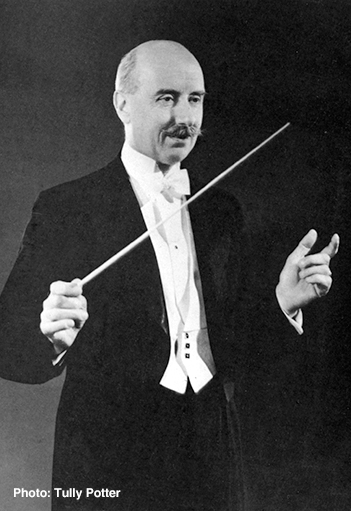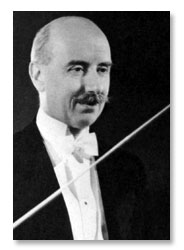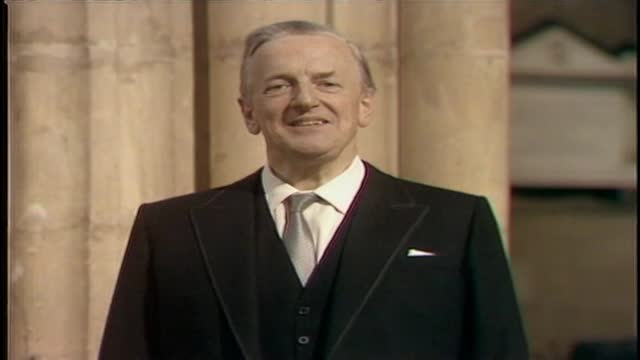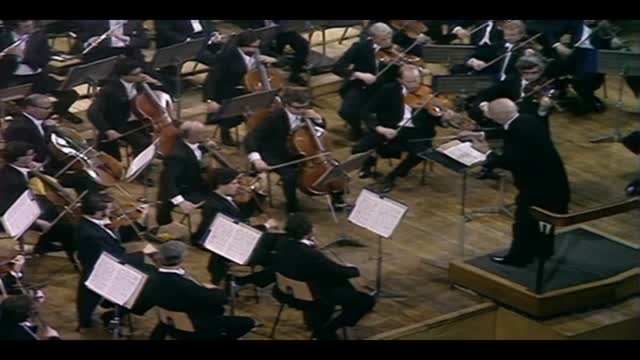

Adrian Boult was born in the north of England into a mercantile family. He was educated at Westminster School in London, and then at Christ Church, Oxford, receiving a doctorate in music in 1914. Following his time at Oxford, he studied with Max Reger at the Leipzig Conservatory for the academic year 1912–1913, and while in Leipzig was able to observe the charismatic conductor of the Leipzig Gewandhaus Orchestra, Arthur Nikisch, in action.
After returning to England Boult conducted opera at Covent Garden and assisted the conductor Artur Bodansky on a production of Parsifal there in 1914. After working for the War Office during World War I, in 1918 he conducted the first performance of Holst’s The Planets at a private performance at the Queen’s Hall, and also led several concerts for the Royal Philharmonic Society, then one of the major musical organisations in England. The following year he joined the staff of the Royal College of Music where he taught until 1930, and conducted the autumn season of Diaghilev’s Ballets Russes. The early 1920s saw Boult conducting the British National Opera Company in heavyweight repertoire that included Die Walküre, Parsifal and Otello; the British Symphony Orchestra (formed from ex-servicemen), and the London Symphony Orchestra; and in 1923 he directed the first season of Sir Robert Mayer’s children’s concerts.
Boult’s first major musical position came in 1924 when he was appointed conductor of the City of Birmingham Orchestra, following his work as conductor of the Birmingham Festival Choral Society. He stabilised the orchestra and raised its standard significantly, returning to Covent Garden in 1926 as assistant musical director. He was quite active in the recording studio, simultaneously acquiring a reputation for typically English eccentricity: the producer of his first recording for the Velvet Face label, Joe Batten, recalled him bicycling across London to the company’s studio in Peckham in the pouring rain and conducting as though nothing had happened despite being completely drenched.
The late 1920s saw the emergence of national broadcasting organisations across Europe and with them many new opportunities for conductors. In 1930 Boult was appointed as music director of the British Broadcasting Corporation and chief conductor of the new BBC Symphony Orchestra. As this was able to offer salaried employment to musicians, then an unheard-of luxury for orchestral players in England, Boult was able to attract front-rank instrumentalists to it. In addition the orchestra enjoyed extensive time for rehearsal. As a result of these factors and Boult’s leadership, the orchestra soon became renowned for its high standards. Not only did it attract major international musical figures such as Arturo Toscanini and Bruno Walter, it also toured to Europe, making an especial impact in Vienna in 1936. Boult himself guest-conducted extensively in Europe and the USA during the 1930s. He was knighted in 1937 and from 1942 to 1950 was associate conductor of the Promenade Concerts. Boult and the BBC Symphony Orchestra made many recordings for EMI, several of which have well stood the test of time.
In 1950, having been compelled to leave the BBC on reaching the bureaucratic age for retirement of sixty, Boult immediately became chief conductor of the London Philharmonic Orchestra, remaining in this position until 1957. Although in theory now retired he continued to guest-conduct and to record prolifically until 1978, returning to the City of Birmingham Symphony Orchestra for the 1959–1960 season, and teaching once more at the Royal College from 1962 to 1966. Here his most devoted pupil was probably the conductor Vernon Handley, who has continued Boult’s unstinting support for English music. During his later years, Boult enjoyed an Indian summer in the recording studio largely through the efforts of the EMI recording producer Christopher Bishop, who recognised his skill in English music and the nineteenth-century German repertoire.
Boult was a highly professional conductor. Despite his occasionally impassive physical manner on the rostrum he was able to create performances of tremendous dynamism. If evidence was needed of this one need look no further than his dramatic reading of the Symphony of César Franck, recorded originally for the Reader’s Digest organisation. Throughout the 1950s he made many recordings both for the major companies, such as EMI and Decca, and for smaller organisations such as Nixa, Pye, Vanguard and Westminster. It now seems extraordinary that such an effective disciple of Nikisch did not record a complete cycle of the Beethoven symphonies. His recordings of Symphonies Nos. 3, 5, 6 and 7 for Vanguard are outstanding, as are his accounts of the tone poems of Sibelius for the same label. To be put with these recordings are his complete cycles of the symphonies of Brahms and Schumann for Pye/Nixa; he later re-recorded the Brahms cycle for EMI. He also led an interesting group of early stereo recordings for Everest that included Hindemith’s Symphony in E flat major, Mahler’s Symphony No. 1, Shostakovich’s Symphony No. 6, Vaughan Williams’s ballet Job (brilliantly recorded in the Royal Albert Hall), and the first recording of the same composer’s Symphony No. 9, made shortly after the composer’s death and graced with a short speech in his memory from Sir Adrian. This was a vital appendix to his recordings of the first eight of Vaughan Williams’s symphonies for Decca. As well as his enormously valuable late recordings for EMI, which included the two symphonies of Elgar and some magisterial Wagner, Boult also recorded English music for the small label Lyrita, restoring much forgotten music to circulation.
Like all major artists, Boult could have his ‘off’ days, simply allowing his sheer professionalism to carry him through. But when completely involved he was able to create performances that easily stood comparison with the best that Europe and America had to offer.
© Naxos Rights International Ltd. — David Patmore (A–Z of Conductors, Naxos 8.558087–90).
| Title | |
| ELGAR, E.: Dream of Gerontius (The) (Baker, Pears, Shirley-Quirk, London Philharmonic Choir and Orchestra, Boult) | |

|
ELGAR, E.: Dream of Gerontius (The) (Baker, Pears, Shirley-Quirk, London Philharmonic Choir and Orchestra, Boult)
Composer:
Elgar, Edward
Artists:
Baker, Janet -- Boult, Adrian -- London Philharmonic Choir -- London Philharmonic Orchestra -- Pears, Peter -- Shirley-Quirk, John
Label/Producer: ICA Classics |
| VAUGHAN WILLIAMS, R.: Symphony No. 8 / Job (Boult) | |

|
VAUGHAN WILLIAMS, R.: Symphony No. 8 / Job (Boult)
Composer:
Vaughan Williams, Ralph
Artists:
Boult, Adrian -- London Philharmonic Orchestra
Label/Producer: ICA Classics |
